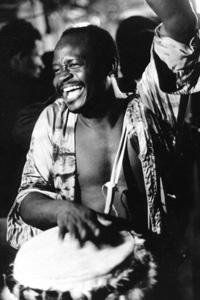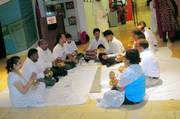In the October 2009, I had the pleasure of witnessing a riveting performance of La Troupe Makandal, led by Frisner Augustin, in Providence, Rhode Island. In the following article, published in World Music Central, A Romero announces the passing of master drummer Augustin, and gives an account of his musical journey.

Haitian musician Frisner Augustin passed away on February 28th, 2012 at Bernard Mevs Hospital in Port-au-Prince (Haiti). He died of a brain hemorrhage.
Frisner Augustin was the artistic director and master drummer of La Troupe Makandal.
Frisner Augustin was the artistic director and master drummer of La Troupe Makandal. “Frisner was an ountògi, a master drummer of Vodou. He was an oungan sou pwen, that is, on the point of the Vodou priesthood,” said Lois Eileen Wilcken, executive director of La Troupe Makandal.
Frisner Augustin was born March 1, 1948, in Port-au-Prince, Haiti. His father, Julien Augustin, was an itinerant carpenter. Most of the time his mother, Andrea Laguerre, and her mother, Rose Laguerre, raised him. Frisner’s mother occasionally produced industrial crafts and tourist items; at other times she was unemployed, and the family struggled to survive. His family could not afford to send him to school.
When he was a young boy, his uncle played drums and traveled throughout the Caribbean. Growing up, Augustin admired his uncle and wanted to become a drummer himself, hoping to earn enough money to help his mother and sister out of poverty. His father sent him to welding school to learn a trade. “But anytime I go to my job, my school for welding,” Augustin recalled, “I think about drumming. When I’m on the street, I clap my hands and sing…. Sometimes I’m on the job. I put some pieces together with a torch, and I keep thinking about my drumming.”
After years of watching his uncle, Augustin decided to ask one of the other drummers at a traditional Vodou ceremony if he could participate. “I ask one of the guys, ‘Can I do something?’ And I’m afraid to ask him that, because he’s bigger than me. He says, ‘Frisner, can you do it? You think you can do it?’ I say, ‘Well, let me try.’ I talk like that because I’m scared. This guy gives me the ogan. I play it, and I see that the guy doesn’t take it away from me. He still lets me play. And I say to myself, ‘I’m good.’”
This began Augustin’s apprenticeship period, during which he perfected his timing. After playing the ogan for a while, he moved on to the boula (ostinato drum) and then the segon (second drum). Augustin believed Ogou, the master spirit of the Vodou ceremony, was guiding his drumming. In a relatively short time, he learned to play everything needed for the Vodou ceremonies and was ready to advance to the maman, the master or lead drum. He was then only 10 or 11, unusually young to play lead drum. “They had to put me in the chair,” he said, “and put a rope around the chair to hold me and the drum up.”
As an apprentice maman drummer, Augustin had to go through an initiation ceremony that prepared him for the responsibilities of “making the drum talk.” The first drum he received was a burned-out mahogany shell onto which he had to attach a drum head. Putting the head on a drum is a ritual “presided over by the spirits.” A shaved, wet goat or cow skin is placed over the wooden shell and allowed to dry overnight. The next day the skin is tied and tightened around wooden pegs, and holes are cut into the drum body. Through this initiation ceremony the drummer communicates with the spirits.
Concurrent with his participation in Vodou ceremonies, Augustin continued attending welding school and was able to help support his family. In 1961, he was invited to join a drum troupe traveling to Puerto Rico and began earning his living from drumming.
In 1972 he emigrated to New York (United States of America), where he established himself as a master drummer in Vodou rituals, as a performer for Haitian community festivals, and as a drum instructor.
In 1981 Mr. Augustin took over the direction of the company La Troupe Makandal. His recordings with the Troupe, A Trip to Voodoo, Erzili, and The Drums of Vodou, feature his settings of traditional Afro-Haitian dances. He has recorded as well for jazz artist Kip Hanrahan and for the soundtrack of the film Beloved.
In addition to performing in theaters, galleries, festivals, and educational venues, Mr. Augustin taught a workshop in Haitian drumming at Hunter College, the Krik! Krak! workshop for children at three sites in Brooklyn, and classes and lecture-demonstrations through the Brooklyn Arts Council and City Lore. He also worked with the Haitian-American children’s dance company Tonel Lakay.
Clearly aware of the negative stereotyping of Vodou, Maestro Augustin used his drum to recast the mystery of the religion from a positive perspective.
Because of his dedication, he received a People’s Hall of Fame award from the cultural center City Lore, and a Certificate of Achievement from the National Coalition for Haitian Rights. In 1999 the National Endowment for the Arts awarded him a National Heritage Fellowship, the United States of America’s highest honor in the folk and traditional arts.
For the original posting: Haitian Master Drummer Frisner Augustin Dies | World Music Central.org.

